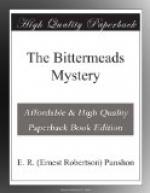Abruptly, a small child appeared out of the darkness and spoke to him, and he started violently and in a very nervous manner.
“What was that? What did you say, kiddy?” he asked, recovering himself instantly and speaking this time not in the gruff and harsh tones he had used before but in a singularly winning and pleasant voice, cultivated and gentle, that was in odd contrast with his rough and battered appearance. “The time, was that what you wanted to know?”
“Yes, sir; please, sir,” answered the child, who had shrunk back in alarm at the violent start Dunn had given, but now seemed reassured by his gentle and pleasant voice. “The right time,” the little one added almost instantly and with much emphasis on the “right.”
Dunn gravely gave the required information with the assurance that to the best of his belief it was “right,” and the child thanked him and scampered off.
Resuming his way, Dunn shook his head with an air of grave dissatisfaction.
“Nerves all to pieces,” he muttered. “That won’t do. Hang it all, the job’s no worse than following a wounded tiger into the jungle, and I’ve done that before now. Only then, of course, one knew what to expect, whereas now—And I was a silly ass to lose my temper with that boy at the station. You aren’t making a very brilliant start, Bobby, my boy.”
By this time he had left the little town behind him and he was walking along a very lonely and dark road.
On one side was a plantation of young trees, on the other there was the open ground, covered with furze bush, of the village common.
Where the plantation ended stood a low, two-storied house of medium size, with a veranda stretching its full length in front. It stood back from the road some distance and appeared to be surrounded by a large garden.
At the gate Dunn halted and struck a match as if to light a pipe, and by the flickering flame of this match the name “Bittermeads,” painted on the gate became visible.
“Here it is, then,” he muttered. “I wonder—”
Without completing the sentence he slipped through the gate, which was not quite closed, and entered the garden, where he crouched down in the shadow of some bushes that grew by the side of the gravel path leading to the house, and seemed to compose himself for a long vigil.
An hour passed, and another. Nothing had happened—he had seen nothing, heard nothing, save for the passing of an occasional vehicle or pedestrian on the road, and he himself had never stirred or moved, so that he seemed one with the night and one with the shadows where he crouched, and a pair of field-mice that had come from the common opposite went to and fro about their busy occupations at his feet without paying him the least attention.
Another hour passed, and at last there began to be signs of life about the house.
A light shone in one window and in another, and vanished, and soon the door opened and there appeared two people on the threshold, clearly visible in the light of a strong incandescent gas-burner just within the hall.




